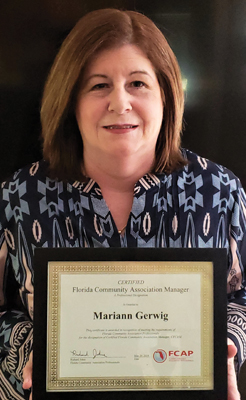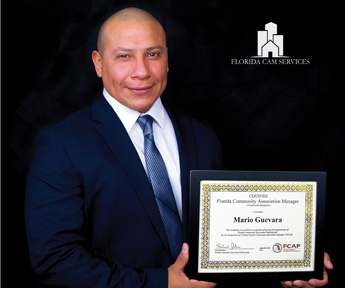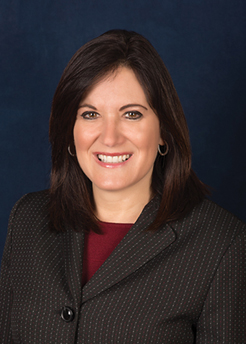
FCAP Community
Published September 2019
Florida Community Association Professionals’ (FCAP) training is offered on two levels. Level one consists of courses meeting Florida’s continuing education requirements for CAMs, and level two is the Florida Advanced CAM Studies (FACS) courses. For further information about the more than 50 online continuing education classes available or to pursue the Certified Florida Community Association Manager (CFCAM) designation, please visit www.fcapgroup.com/membership/education-training/.
 Mariann Gerwig Attains CFCAM Designation from FCAP
Mariann Gerwig Attains CFCAM Designation from FCAP
FCAP (Florida Community Association Professionals) recently recognized Mariann Gerwig as another community association manager to obtain her Certified Florida Community Association Manager (CFCAM) designation.
Gerwig has spent nearly her entire professional career working within the community association industry in southern Florida. She began employment with Carousel Development & Restoration Inc., where she worked for 30 years. During her time with Carousel, Gerwig was the Director of Operations, CFO, and the primary qualifier as the certified general contractor for the company. After a year of employment at Carousel, Mariann had computerized the entire company; and while she was working at Carousel, the company grew from five full-time employees to a staff of more than 250 individuals.
Following her tenure at Carousel, Gerwig started her own company, Gerwig Solutions, where she offers community association management services and consulting to smaller associations. In addition, Gerwig Solutions consults start-up and small businesses by assisting them to become more productive. She also helps them develop written procedures and systems, allowing them to become more efficient in the way they conduct business.
In addition to owning her own business, Gerwig is also employed with Promar Building Services LLC (formerly Promar Painting & Waterproofing), where she serves as the Director of Finance and Operations and is the primary qualifier as the certified general contractor for the company.
While working in the CAM industry, Gerwig has written several articles published in the Florida Community Association Journal, contributed to FCAP’s online educational certification programs, and written classes for the state of Florida for continuing education credit for CAMs.
When asked the two major issues facing CAMs in 2019, Gerwig stated, “Associations are not having enough reserve funds so that special assessments can be avoided,” and, “Board members are not fully understanding all their association documents.” Gerwig was also asked why she decided to pursue the CFCAM designation, and she stated, “I have found that I have a passion for learning and wanting to be the best version of myself. It may not be for any other purpose but to gain knowledge. Since continuing education is required by the state of Florida, why not get the most out of it? Therefore, I decided to take the CFCAM course, even though it far exceeded the state requirement for Florida CAMs. This is similar to asking someone why go for your bachelor’s degree when you can get an associate’s degree and still get the same type of job you want. It is the satisfaction of knowing that you are bringing the best you can to a job or client.”
Mariann Gerwig is another example of excellence in the industry. Congratulations again to Mariann on obtaining her CFCAM designation!
 Mario Guevara Attains CFCAM Designation from FCAP
Mario Guevara Attains CFCAM Designation from FCAP
FCAP (Florida Community Association Professionals) recently welcomed Mario Guevara, owner of Florida CAM Services, as another community association manager to obtain his Certified Florida Community Association Manager (CFCAM) designation.
Mario entered the workforce at the early age of 14, assisting his father with various jobs in the transportation industry. He later began a business in this same industry, where he ran the company as an owner and operator before engaging in the community association management field in Florida.
In February of 2015, Mario received his real estate license; and in July of that same year, he acquired his Florida CAM license. This began his career in the community management industry. At this same time, Mario started his own community association management firm that eventually became known as Florida CAM Services, a business that focuses on serving Fleming Island and all of Clay County in northeast Florida.
When asked why he decided to become a CAM, Mario stated, “I saw a need to provide local, personalized management services in Fleming Island as many of the management companies were not operated by local companies with local owners. I have always viewed myself as a people person with a desire to help and serve others and felt like this profession would give me that opportunity.” When asked what the most rewarding thing about his job is, Mario responded, “Finding unique solutions to difficult problems. As I have placed the right people and vendors in place, the associations run more efficiently, and it is rewarding to watch and manage this progression.” Mario was also asked why he wanted to pursue the CFCAM designation, and he said, “The CFCAM designation was an opportunity for me to get more in-depth, practical knowledge of dealing with issues my associations face.”
By earning his CFCAM accreditation, Mario joins an elite group of 54 CAM professionals who have earned their CFCAM designation offered by FCAP. We congratulate Mario Guevara on obtaining his Certified Florida Community Association Manager designation and having the desire to promote a high level of professionalism to his clients and business partners each and every day.
CAM to CAM
First Impressions—It Starts at the Front Desk
Marcy L. Kravit, CMCA, AMS, PCAM, CFCAM
Florida Community Association Professionals (FCAP) Education and Training Coordinator
AKAM On-Site Managing Director
Question:
What tips do you suggest for a good first impression by the front desk team in my high-rise?
Answer:
My experience in managing luxury high-rises has provided me with the wonderful opportunity to create a great first impression for a memorable experience with a five-star lifestyle by training my front desk teams to maintain, preserve, and protect some of the most impressive condominium associations.
When it comes to refined service and exquisite hospitality, one name comes to mind: The Ritz-Carlton Hotel Company. I have read The New Gold Standard: 5 Leadership Principles for Creating a Legendary Customer Service Experience by Joseph A. Michelli. I highly recommend that managers read it and follow the key principles that provide a customer experience unlike any other.
Studies indicate that first impressions are made within the first 17 seconds of meeting someone new. Fifty-five percent of that impression is based on appearance, seven percent is based on the words used, and thirty-eight percent is based on tone of voice. This means that before we even get sufficient time to display our abilities, the first impression is already formed.
Body language, mannerisms, behaviors, appearance, and personal grooming can influence a customer’s first impression.
A condominium high-rise is a 24/7 operation. First impressions are critical. The first step in creating a great first impression is selecting front desk personnel who are professional, committed to customer service, and willing to take an oath of protecting the residents’ privacy, maintaining confidentiality, handling emergencies professionally, securing the building through access control, and performing as an ambassador. It is essential that the front desk staff are trained to be focused, have a good attitude, listen effectively, and communicate clearly. Your employees are an extension of you!
Phone lines are ringing; residents are asking questions—inquiring about a package, prescriptions, and/or perishables; food delivery personnel and guests are waiting at the desk to be called up to a unit and for the door to be released; the security cameras go out, or there’s a power outage and then the activation of the fire alarm sounds. Front desk staff are like octopuses and must be prepared for the unforeseen incidents!
Their physical space at the desk is an important part of their image that should not be neglected. It is important that they are organized and maintain clean desk space and a professional environment.
How do the front desk personnel handle several people, events, and inquiries simultaneously with professionalism and poise?
It’s the small details that can portray a friendly, positive attitude in handling customers, residents, guests, and vendors. It is just as important to pay attention to these small details over the telephone. It is critical to use appropriate greetings that are warm and welcoming and place callers on hold politely. Front desk staff should exude confidence and always smile. It comes through on the phone.
It is also just as important to take messages quickly and accurately, transfer calls with ease and grace, and end calls with the chatty callers that have a complaint or just want to be heard, all without being abrupt or rude.
Another critical skill that will enhance professionalism and promote exceptional customer service is communication skills, starting with consistently greeting every individual who approaches the desk. It is just as important for employees to understand how people differ and how to “read” them and adjust wording to answer questions. Staff should not only know what to say but how to say it! They need to satisfy the needs of those they serve. Their tone of voice and effective listening skills are an integral part of the communication process.
Body language is another important factor that can portray the employee’s professionalism. Posture, arm and hand placement, eye contact, and facial features speak volumes. Being aware of their own body gestures will contribute to improving a professional personal image and increasing front desk staff’s customer service skills.
The sign of true professionalism is their ability to work effectively with problematic customers without losing their patience, internalizing the issue, or taking it personally.
Delivering exceptional customer service to those who may not necessarily deserve it requires special skill and extraordinary self-control. It is a skill to handle visitors who show up to see the manager without an appointment, those residents and visitors who are angry and impatient, and those who might actually pose a threat to the well-being of those in the building. It is important that you meet with the front desk supervisor first thing in the morning and on a weekly basis to review any items of concern or staffing issues. As the manager, you should stop by the property and conduct a surprise visit on the weekends, call after hours, and check in with the front desk.
The Ritz-Carlton “Back to Basics” training teaches the following:
- The Importance of Personal Accountability in Delivering Legendary Service
- You Never Have a Second Chance to Make a Great First Impression
- The Benefits of Positive Employees
- The Relationship with Your Supervisor Is a Two-Way Street
It is important to consistently draft a list of goals and objectives for your front desk team and provide them with updates and memos regarding any pending or upcoming events or activities. With specific goals tailored to meet the condominium’s and the individual’s needs, immediate improvements will be perceived and greatly appreciated. Have an open-door policy, and make your staff aware that you are open to their feedback and available to listen to their ideas in order to improve. If you follow these steps, this will be of a great benefit to the staff, the board of directors, and the condominium residents, and it will create a great first impression for a five-star experience!
Because You Asked
By Betsy Barbieux, CAM, CFCAM, CMCA
Betsy,
I would appreciate your answer to the following situation. One person who wants to run for the board owns five units in the name of his corporation. Can the registered agent of that corporation run as a candidate for the board? Is this possible?
– James
James,
Your documents probably say a corporation should have a designated voter form on file with the association. The person named on the designated voter form can run for the board. Just being a Registered Agent does not entitle someone to represent that unit and be a candidate for the board.
– Betsy
Betsy,
Thank you for the board certification course! I learned a lot and feel I have a lot to still learn. My question is, can our board have a closed meeting with no notice and tell my husband to leave? Apparently during the closed meeting, the board president told the board “everything has to go through her.” I have a hard time with this. Can she have all the control, especially since things are not done correctly? Thanks, Betsy.
– Tammy
Tammy,
The only closed board meetings are (1) when the board is seeking legal advice, (2) when discussing pending litigation with the attorney, or (3) when the board is discussing personnel (not vendors) and the attorney does not need to be present. There is some debate as to whether you post the notice of the closed meeting or not.
Board presidents are not supposed to act unilaterally, but if the other board members let her, then she will.
Condominium owners have recourse for improper meeting procedures through the Division of Condo-miniums; HOA owners do not. HOA owners have to spend their own dollars for attorneys. Here is the website for the complaint form: http://www.myfloridalicense.com/dbpr/lsc/documents/cccomplaint.pdf.
When filing the complaint, you need to cite the specific statute, rule, or document with the provision that was violated.
– Betsy
Betsy,
I have a question, and I cannot find an answer. FPL has moved poles and now have changed the view of several owners so there are power lines and poles that were not there before. Those owners met with FPL and have been given options, one of which is for the association to put the lines underground. This will create an expense to the association for the installation of the underground pipes. Several owners have said they do not feel they should have to pay for an unnecessary expense. Poles have always been there, but are now in a new location. Would this be an owners’ vote as it is not a necessity of the operations of the association but a hampered view issue of just a few?
– Joy
Joy,
With the information you have given me, I don’t believe this is an association issue or a view issue. Likely, the owners did not “purchase” the view. Having a view is not the same as purchasing a view. Most likely, FPL has a utility easement that is noted in each owner’s title insurance policy. I wouldn’t do anything about it, but I am not an attorney. So, you might want to check with yours!
– Betsy





